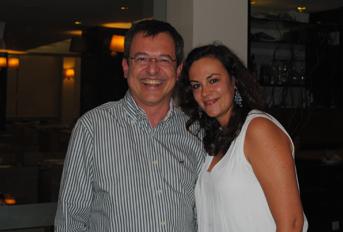Associação Portuguesa de Investigação em Cancro
Perda da expressão de Caveolina-1 e ganho de MCT4 no estroma tumoral: Mecanismos importantes na tumorigénese mamária
Perda da expressão de Caveolina-1 e ganho de MCT4 no estroma tumoral: Mecanismos importantes na tumorigénese mamária

O processo através do qual um carcinoma in situ progride para carcinoma invasivo é ainda um fenómeno pouco esclarecido na tumorigénese mamária. Apesar das alterações genéticas terem um papel preponderante na transformação das células, o microambiente tumoral parece contribuir de forma decisiva para este processo, assim como a interação entre as células e o estroma tumoral. Neste estudo, comparando o carcinoma in situ e o correspondente carcinoma invasor da mesma paciente, observamos a perda da expressão da Caveolina-1, e o concomitante ganho da expressão de MCT4, em 75% dos casos durante a progressão do carcinoma in situ para o carcinoma invasivo da mama. A Caveolina-1 é degradada por stress oxidativo induzido pelos fibroblastos tumorais, resultando na sua perda no carcinoma in situ. Simultaneamente, a perda da Caveolina-1 induz uma reprogramação metabólica no estroma tumoral, resultando na sobreexpressão do MCT4 no carcinoma invasivo, demonstrando a importância das alterações metabólicas na progressão da tumorigénese mamária.
Autores e afiliações:
Martins D1,2, Beça FF1,3, Sousa B1,2, Baltazar F4,5, Paredes J1,3 and Schmitt F1,3
1 IPATIMUP- Institute of Molecular Pathology and Immunology of the University of Porto, Porto, Portugal;
2 ICBAS-Institute of Biomedical Sciences Abel Salazar, University of Porto, Porto, Portugal;
3 FMUP- Medical Faculty of the University of Porto, Porto, Portugal;
4 Life and Health Sciences Research Institute (ICVS), School of Health Sciences, University of Minho, Braga, Portugal;
5 ICVS/3´s-PT Government Associate Laboratory, Braga/Guimarães, Portugal.
Abstract:
The progression from in situ to invasive breast carcinoma is still an event poorly understood. However, it has been suggested that interactions between the neoplastic cells and the tumour microenvironment may play an important role in this process. Thus, the determination of differential tumour-stromal metabolic interactions could be an important step in invasiveness.
The expression of stromal Caveolin-1 (Cav-1) has already been implicated in the progression from ductal carcinoma in situ (DCIS) to invasive ductal carcinoma (IDC). Additionally, stromal Cav-1 expression has been associated with the expression of stromal monocarboxylate transporter 4 (MCT4) in invasive breast cancer. However, the role of stromal MCT4 in invasiveness has never been explored, neither the association between Cav-1 and MCT4 in the transition from breast DCIS to IDC.
Therefore, our aim was to investigate in a series of breast cancer samples including matched in situ and invasive components, if there was a relationship between stromal Cav-1 and MCT4 in the progression from in situ to invasive carcinoma. We found loss of stromal Cav-1 in the progression to IDC in 75% of the cases. In contrast, MCT4 stromal expression was acquired in 87% of the IDCs. Interestingly, a concomitant loss of Cav-1 and gain of MCT4 was observed in the stroma of 75% of the cases, when matched in situ and invasive carcinomas were compared. These results suggest that alterations in Cav-1 and MCT4 may thus mark a critical point in the progression from in situ to invasive breast cancer.
Revista:
Cell Cycle
Link:
https://www.landesbioscience.com/journals/cc/article/25794/




